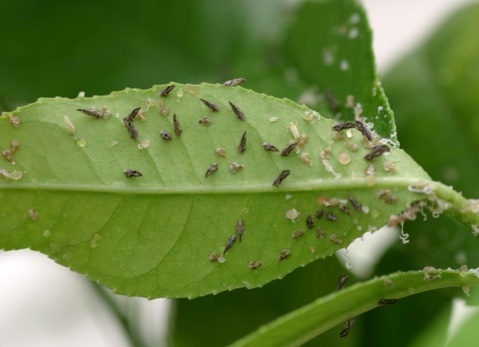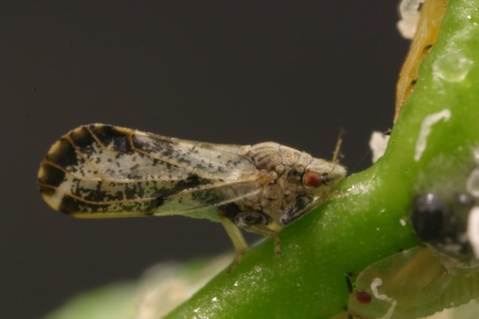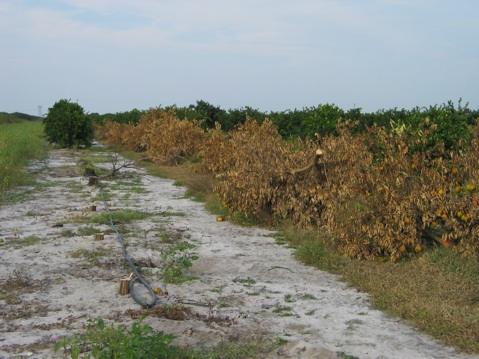The Day of the Psyllids
Fighting Disease-Carrying Asian Citrus Pest Is Critical to Saving County Citrus

Santa Barbara County is in a unique position: diligently find and treat citrus trees for the Asian citrus psyllid or face possibly losing these beloved trees forever. As farmers managing a combined 140 acres of citrus trees, it’s an easy choice — we must act now to save our citrus trees, which represent a $12 million industry in our county and are a backyard staple.

The Asian citrus psyllid, which has been detected recently in Summerland, Carpinteria, and Goleta, is a tiny insect that feeds on the leaves and stems of citrus trees. It can carry, and spread, Huanglongbing, the most devastating citrus plant disease in the world. There is no cure for Huanglongbing, and infected trees will die. We’re fortunate to not have the disease here yet — but stopping the Asian citrus psyllid is the best line of defense. The disease has already been detected in Los Angeles County, and once it makes its way to our region, the Asian citrus psyllid will spread it from citrus tree to citrus tree as it feeds. If left untreated, this tiny pest could mean the end of Santa Barbara County citrus.
Nearly 24,000 tons of lemons were grown in Santa Barbara County in 2012. The citrus industry employs hundreds of workers; many of them have been part of this industry for generations. Family farms dot the county, and for growers like us, citrus isn’t a job — it’s part of who we are. Citrus growers care deeply for our region’s agriculture and environment, and we must do everything we can to stop this pest and disease.
The Santa Barbara County Agricultural Commissioner’s office and California Department of Food and Agriculture are placing traps and treating any trees found to have the psyllid. This free treatment, which includes applying pesticides to the soil and to the leaves of citrus trees, is carefully administered by trained professionals following label instructions. Unfortunately, some beekeepers have noticed a decline in bee populations and believe pesticides could be playing a role. While any possible cause of bee decline is worth exploring, the truth is, we still don’t know exactly why bee declines are happening.
A 2012 study released by the United States Department of Agriculture and Environmental Protection Agency says stress on hives is the reason for bee decline and that several factors — from parasitic mites and disease, to genetics, poor nutrition, and pesticide exposure — are contributing. There is no one cause for the problem, according to the study, and we need more research in this area.
We need to protect bees — an important part of our agricultural community as pollinators of crops that feed our families — but we also need to protect the landscape and agriculture that makes our region so vibrant. Crews use the utmost care when applying treatments, and agriculture officials and the citrus industry are also exploring alternative methods of controlling the psyllid, such as organic options and the release of a tiny, stingless wasp called Tamarixia. Tamarixia is a natural predator of the psyllid, and it was recently released in Carpinteria to support the effort to control psyllid populations.

The citrus industry and researchers are also pouring resources into finding solutions for the incurable Huanglongbing. Until a cure for the disease is found, stopping the Asian citrus psyllid remains the best way to protect our community’s citrus.
Residents can help proactively keep the pest and disease out of our area by not moving citrus trees or fruit into Santa Barbara County from other areas. In addition to Los Angeles, the psyllid and disease have been detected in other states and countries, including Florida, Texas, and Mexico. Do not bring back citrus fruit or plants from these areas because you could unknowingly bring the pest and disease along with them. Instead, buy your citrus from reputable, licensed nurseries or home and garden centers here so you know you’re getting a healthy tree and also supporting our local economy.
Everyone in Santa Barbara County plays a role in preserving the fresh citrus trees that have become so iconic to California. Visit CaliforniaCitrusThreat.org to learn more about this threat and see photos that can help you identify and stop the Asian citrus psyllid.
Ken Doty and Sam Frye are citrus growers in Santa Barbara County.



